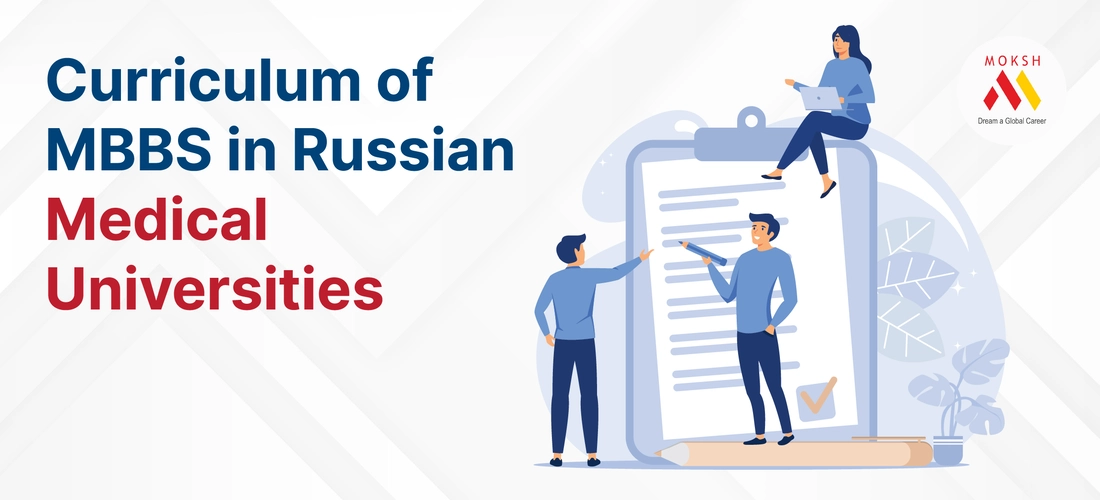
For aspiring doctors seeking an international medical education, MBBS in Russia presents a compelling option. Renowned for its strong academic foundation and affordability, Russian medical universities attract students worldwide.
But what exactly does the MBBS curriculum in Russia entail? Buckle up for a deep dive into the six-year journey that awaits you.
The MBBS curriculum in Russian medical universities is generally quite similar to the MBBS curriculum in other countries, such as India. It typically lasts for six years and covers a wide range of medical topics, including:
- Basic sciences (anatomy, physiology, biochemistry, etc.)
- Medical humanities (ethics, communication skills, etc.)
- Pre-clinical subjects (pharmacology, pathology, microbiology, etc.)
- Clinical subjects (medicine, surgery, pediatrics, obstetrics & gynecology, etc.)
- Internship
Structure and Stages
The MBBS program in Russia follows a structured approach divided into theoretical and practical components. The six years are broadly categorized into three stages:
Pre-Clinical Stage (Years 1 & 2): This initial phase lays the scientific groundwork for your medical career. Expect intensive courses in fundamental subjects like:
- Biology (Human Anatomy & Physiology, Histology)
- Chemistry (Organic & Inorganic Chemistry, Biochemistry)
- Physics (Medical Physics)
- Latin Terminology
- Mathematics
Clinical Stage (Years 3 & 4): Here, theoretical knowledge gets applied. You'll delve into core medical disciplines like:
- Internal Medicine (Cardiology, Pulmonology, Gastroenterology)
- Surgery (General Surgery, Orthopedics, Neurosurgery)
- Pediatrics (Neonatology, Child Health)
- Obstetrics & Gynecology
- Psychiatry & Neurology
- Pharmacology & Toxicology
- Pathology & Forensic Medicine
- Public Health & Hygiene
Clinical Clerkships and Internship (Years 5 & 6): This is where theory truly meets practice. You'll rotate through various hospital departments, gaining hands-on experience under the guidance of experienced doctors.
Subject of MBBS in Russia
Have a look below at the MBBS subject in Russia:
| Year | Subject | Total Teaching Hours | |
|---|---|---|---|
| Lecture | Practical | ||
| 1st | History | 20 | 36 |
| Physics, Mathematics | 14 | 42 | |
| Biology | 14 | 42 | |
| Basics of patient care | 4 | 52 | |
| Human Anatomy | 48 | 184 | |
| Histology, Embryology, Cytology | 24 | 88 | |
| Latin Language | 56 | - | |
| Foreign language | 56 | - | |
| Public safety | 12 | 44 | |
| Physiology | 52 | 120 | |
| Biological Chemistry | 48 | 124 | |
| 2nd | Philosophy | 20 | 36 |
| Psychology and pedagogy | 12 | 44 | |
| Economics and Law | 16 | 40 | |
| Microbiology | 44 | 128 | |
| Topographic anatomy and operative surgery | 24 | 88 | |
| Nursing | 4 | 52 | |
| Pathological anatomy | 52 | 120 | |
| Pathophysiology | 40 | 132 | |
| Propedeutics of internal diseases | 24 | 148 | |
| General surgery | 24 | 88 | |
| 3rd | Pharmacology | 52 | 120 |
| Radiodiagnostics | 8 | 48 | |
| IT and e-health | 8 | 48 | |
| Internal medicine | 30 | 142 | |
| Fundamental surgery | 24 | 88 | |
| Hygiene | 24 | 88 | |
| Public Health | 24 | 88 | |
| 4th | Otorhinolaryngology | 8 | 48 |
| Ophthalmology | 8 | 48 | |
| Anesthesiology, Resuscitation | 8 | 48 | |
| Neurology, Neurosurgery | 24 | 88 | |
| Medical genetics | 8 | 28 | |
| Obstetrics and Gynecology | 60 | 224 | |
| Dermavenerology | 8 | 48 | |
| Urology | 8 | 48 | |
| Medical rehabilitation | 8 | 48 | |
| Surgery | 36 | 136 | |
| Hospital medicine | 50 | 182 | |
|
5th
|
Psychiatry, Medical Psychology | 18 | 94 |
| Pediatricians | 36 | 136 | |
| Infectious diseases | 30 | 142 | |
| Traumatology, Orthopedics | 24 | 88 | |
| Endocrinology | 8 | 48 | |
| Phthisiology | 8 | 48 | |
| 6th | Oral surgery | 4 | 32 |
| Medical emergencies | 6 | 50 | |
| Epidemiology | 8 | 48 | |
| Clinical Pharmacology | 24 | 88 | |
| Outpatient service | 30 | 142 | |
| Oncology, Radiotherapy | 8 | 48 | |
| Forensic medicine | 8 | 48 | |
| - | Total Hours | 980 | 4300 |
Understanding the MBBS Curriculum in Russian Medical Universities:
1.Foundation Years:
- The MBBS curriculum typically spans six years, divided into pre-clinical and clinical phases.
- The foundation years focus on building a strong understanding of fundamental medical sciences such as anatomy, physiology, biochemistry, and microbiology.
- Students undergo rigorous theoretical training supplemented by practical laboratory sessions to grasp the essential concepts of human biology and disease mechanisms.
2.Pre-Clinical Phase:
- The pre-clinical phase usually covers the first two to three years of the MBBS program.
- Subjects include pathology, pharmacology, immunology, genetics, and medical psychology.
- Emphasis is placed on developing a profound knowledge base in medical sciences, preparing students for the clinical aspects of their education.
3. Clinical Phase:
- The clinical phase commences in the latter years of the MBBS program, typically from the fourth year onwards.
- Students transition from classroom-based learning to hands-on clinical training in hospitals and healthcare facilities.
- Core clinical subjects include internal medicine, surgery, pediatrics, obstetrics and gynecology, psychiatry, and community medicine.
- Students rotate through various clinical departments, gaining practical experience under the supervision of experienced physicians.
4. Electives and Specializations:
- Russian medical universities provide a wide range of elective courses and specializations to cater to diverse interests and career aspirations.
- Students have the opportunity to explore areas such as cardiology, neurology, oncology, radiology, emergency medicine, and more.
- Elective rotations allow students to gain in-depth knowledge and hands-on experience in their chosen fields, helping them make right decisions about their future careers.
5. Research and Thesis Work:
- Research is an integral component of the MBBS curriculum in Russian medical universities.
- Students are encouraged to participate in research projects, conduct research, and contribute to the advancement of medical knowledge.
- The culmination of the research component is the completion of a thesis or dissertation, where students demonstrate their understanding of research methodology and critical thinking skills.
6. Clinical Skills Training:
- Practical clinical skills training is a key focus of the MBBS curriculum.
- Students undergo extensive training in clinical skills such as history-taking, physical examination, diagnostic procedures, and patient management.
- Simulation labs equipped with advanced medical manikins and simulated patient scenarios provide a realistic learning environment for students to hone their clinical skills.
7. Integration of Modern Technology:
- Russian medical universities integrate modern technology into the MBBS curriculum to enhance learning outcomes.
- Virtual learning platforms, online resources, and e-libraries provide students with access to a wealth of educational materials and medical literature.
- Simulation-based training using virtual reality (VR) and augmented reality (AR) technology allows students to practice complex medical procedures in a safe and organised environment.
8.Clinical Rotations and Internship:
- The final year of the MBBS program typically includes clinical rotations and a mandatory internship.
- During clinical rotations, students work alongside healthcare professionals in different specialties, gaining practical experience and exposure to diverse patient populations.
- The internship period allows students to consolidate their knowledge and skills, preparing them for independent medical practice upon graduation.

Cost of MBBS in Russia
The cost of studying MBBS in Russia for Indian students is generally considered affordable compared to other options. Here's a breakdown:
Total MBBS Fees: The total cost can range from 14 to 30 lakhs (Indian Rupees) for the entire six-year program. This typically includes tuition fees, hostel accommodation, and medical insurance.
Yearly Cost: On average, expect to pay around 2.5 to 5 lakhs (Indian Rupees) per year.
Additional Expenses: Remember, living expenses like food and personal needs are not included in the tuition fees—budget around 10,000 rupees (Indian rupees) per month for these.
Note: Be aware of fake Study abroad consultants. You have to pay your own tuition fees when you arrive at the university. No tuition fees are allowed to be paid by any agent.
Conclusion
The MBBS curriculum in Russia offers a well-rounded medical education, blending theoretical knowledge with practical experience at an affordable cost. If you're an aspiring doctor seeking a challenging and rewarding academic journey, an MBBS in Russia could be the perfect stepping stone for your medical career. Remember, thorough research into specific universities, their curriculum structure, and accreditation status is crucial before making your decision.









